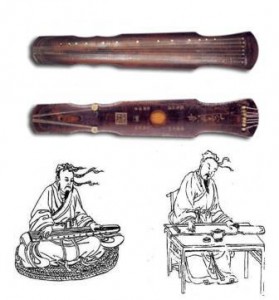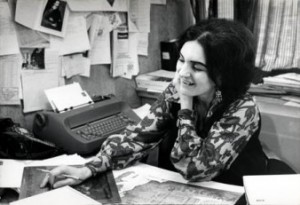Blind WIllie Johnson, born in Texas: only one photo survives.
Johnson asks us “What is the soul of a man?“*
[I] Wan’t somebody to tell me, answer if you can!
I Want somebody to tell me, just what is the soul of a man
I’m going to ask the question, please answer if you can
If anybody surely can tell me, just what is the soul of a man?
I’ve traveled different countries, I’ve traveled in furthest lands
I’ve found nobody could tell me, just what about the soul of a man.
I saw a crowd stand talking, I just came up in time
Was teaching the lawyer, the doctors: well a man ain’t nothing but his mind.
I read the bible often, I tries to read it right
And far as I could understand, [don’t you go to burning light? ]
When Christ sat in on the temple, the people, Lord, stood amazed
Was teaching the lawyers and doctors, how to raise a man from the grave
*n.b. The text provided by the YouTube poster has been corrected here.
Meanwhile, around 500 B.C. in China, Confucius and his disciples used a string instrument the gu qin for spiritual purification.
Ideally it was to be played by Taoist amateurs outdoors, in harmony with trees and birds. The left hand’s movement along its silk strings excited a scratchy sound they considered to be the instrument’s breathing. In Chinese society, few ever gained access to this discipline and art. Barely surviving Mao’s cultural revolution, a few practitioners kept the ancient practice alive. One player was aviator Zha Fuxi, who stopped in the United States around 1946, sent over as the head of China’s airforce by Chiang Kai Shek. He carried one on board and was recorded in Washington. When the Revolution came, he sided with Mao and was honored by the red emperor who granted him free pursuit of his great love, the gu qin. Here is an unpublished fragment of his playing:
This snippet offers a work presented in a metrically recited delivery, supported by the instrument’s heavy breathing. It is not different from his other glacially slow half-hour pieces, all elaborated by carefully placing each note into a designated pattern, like an assembly line.
Going back and forth to the twentieth century, a cultural nexus entered and emanated from Teresa Sterne, a child prodigy pianist who guided the life behind hundreds of recordings of early music, the newest of the new, and world music for Nonesuch Records.
Tracey’s erudition was revelatory to our lives and nourished our development. The privilege of knowing her during her final years came to an end when she was devastated by illness. Asked to aid in organizing her massive archive, I espied a 1930s Depression era economic edition of Mark Twain, one that she spoke fondly of as having been a catalyst for cultural development and philosophical investigation, a lifelong companion. The books arrived periodically at her local Boro Park Brooklyn’s newsstand and as she and her family dwelled in what she termed “genteel poverty”, they were attainable treasures. It seemed that their role in her life inspired her to guide a recording company that would offer the same affordability for great music.
One shelf held a dormant pile of desultorily filed audition tapes that she had turned down for publication. Opening one tiny reel-to-reel tape box yielded an intriguing photo of an elegant, refined older gentleman playing the gu qin. Knowing how Chinese classical music encompassed a range of vocalized theatrical cat fights to dull square-peg-into-square-hole meditative music, I was curious how this vigorous man would play the classic Teals descending on the sand:
Tucked into the tiny box was a letter written to Tracey in 1970 by an American who lived in Hong Kong and had become a pupil of this Lo Ka Ping, a seventy-five year old native of Guangdong, China, self taught Taoist priest who taught English in the New Territories inside a house filled with instruments dating back one thousand years. The note requested that she return his photo and recording if the project would not take off. Over thirty years later, I traced Dr. Dale Craig and we published Lost Sounds of the Tao with Craig’s enigmatic photo on the cover. Our rescue of Lo’s art is documented here.
Lo Ka Ping’s playing conveyed a spirit missing in the sterile rote-playing of the scholars, a surprising observation reached after hearing as many other gu qin players as possible, With Lo’s first sounds, Blind Willie Johnson immediately came to mind, with one specific piece connecting them.
In Dark was the night, Johnson transcends his proselytizing framework, as the title and visionary mood suggest a metaphor of blindness illuminating a departure into an inner world of transcendence, as Lo and his forbears would purify themselves with their music.
The silk-stringed zither was remote to generations of an immense Chinese population who still are unaware of its sounds and role in their tradition. The fragments that survived in near isolation never developed beyond its closed circle, although Lo’s discovery and mastery of his ancestral music led him to compose new works for his cherished instrument. Musical spirituality in Blind Willie Johnson’s world was far from being restricted to any circle of philosophers but openly shared as an integrative force in his society’s lives. Its development into jazz and resonances into other genres keep it as a perpetually re-emerging marvel in American music. Behind it all is the act of approaching a sacred human essence, portrayed as divine by organized religions, yet experienced weekly, such as its emergence in the Chicago-based Rev. Amos Waller’s sung sermon on stormy weather:
When words grasp towards approaching these states they rise into raw elemental sounds, finding the Rev. soaring onward against a mesmerizing rhythmic incitement to go beyond in his Holy Ghost Rock.




Thank you for this insightful posting and for sharing this incredible music, Allan. Japanese music I know very well, but Chinese music I’m not too familiar with, I’m afraid. This is an incredible discovery and I will be purchasing this disc soon.
Thank you again for all your hard work on behalf of great music.